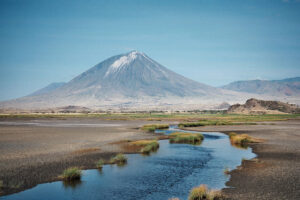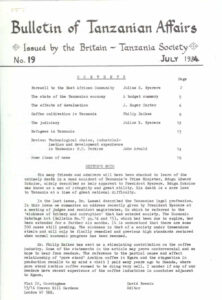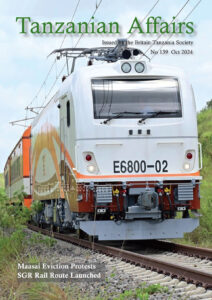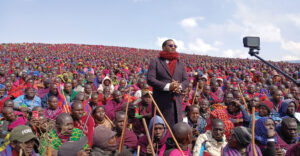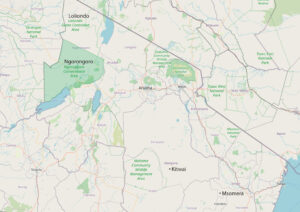by Martin Walsh
MYSTICAL POWER AND POLITICS ON THE SWAHILI COAST: UCHAWI IN PEMBA. Nathalie Arnold Koenings. James Currey, Woodbridge, Suffolk, 2024. xxii + 286 pp. ISBN: 9781847013842 (hardback) £95.00; ISBN 9781805433231 (e-book, EPDF) £29.95; ISBN 9781805433248 (e-book, EPUB) £29.95.
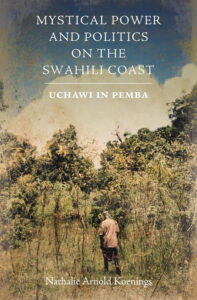
In Mystical Power and Politics on the Swahili Coast: Uchawi in Pemba, anthropologist Nathalie Arnold Koenings paints a picture of a society where the visible and invisible, the mundane and the mystical, are deeply intertwined and where colonial and local perspectives often clash and converge in complex ways. Insisting that scholars of Zanzibar should pay more attention to Pemba, where she has done research since 1996, Arnold Koenings demonstrates how uchawi (typically translated as ‘witchcraft’ but here ‘mystical power’ and usually left untranslated)—entangled with rather than juxtaposed with uganga ‘healing’ and Islam—“has shaped Pemban histories and worlds and that, in old, new and ever-changing forms it continues to do so” (p. 20). Part history, part anthropology, part love letter to Pemba, the book will change how scholars think about uchawi, uganga, and Zanzibar.
After the Introduction, the book has three parts. The first and longest part, “Power”, which Arnold Koenings rightly describes as the book’s “ethnographic heart” (p. 21), has five chapters. The first uses her experience with wachawi ‘witches’ (disguised as dogs) and waganga ‘healers’ to introduce the centrality of “mystical power” to everyday life in Pemba. She then juxtaposes that experience with archival colonial reports. A central theme linked to Arnold Koenings’s work as a storyteller is the role of narration in both local experiences and colonial documents. Like Popobawa in my work, Arnold Koenings shows that uchawi “has a lively discursive life” (p. 33), and whether one believes in it or not, how people talk about it has real effects on the world. Chapters Two, Three, and Four take us on a tour of “uchawi’s house”, a central theoretical (and, in some accounts, material) structure introduced to Arnold Koenings by a jinn, Shekhe Abdulaziz wa Bahr al Shem, who possessed one of her interlocutors. Encountering an interview with a jinn as a central primary source surprised me, but not, it seems, Arnold Koenings; it is a fascinating part of the book, and I was equally fascinated by her nonchalant treatment of it.
According to the jinn-sheikh, uchawi is a house with seven rooms, each representing a different level or type of uchawi, from the simplest forms practised by ordinary people to more complex and powerful forms. We encounter the first four rooms in Chapter Two (uchawi of a jealous soul, uchawi of those who keep jinn, uchawi that uses jinn to harm others, and the uchawi of those falsely claiming to have mystical knowledge). In Chapter Three, we enter the fifth room: uganga. While many previous scholars (and, in my experience, many people who visit waganga) distinguish uchawi and uganga, Arnold Koenings convincingly demonstrates that they share a common origin, knowledge base, and tools and that the distinction between them is often ambiguous and context-dependent. Chapter Four explains the sixth and seventh rooms of uchawi. The sixth involves powers of “invisibility, shapeshifting, bilocation and flight”, and, again, we see that these “extreme capacities are reserved for experts across both categories”—wachawi and waganga (p. 87). The seventh room comprises “uchawi’s most murderous realms” inhabited by wachawi who require child sacrifice (p. 96). In the final chapter of the book’s first part, Arnold Koenings examines uchawi in relation to power in ordinary Pemban life and discourse.
In the book’s second part, “Crisis”, Chapters Six and Seven turn to the effects of the Zanzibar Revolution on Pemba. In Chapter Six, Arnold Koenings demonstrates how, before the revolution, power and authority were associated with elders, crystallised in the institution of usheha ‘headmanship’, and that both sheha and elders, more generally, were associated with mystical power. During and after the revolution, age-based power relations were disrupted, often through violence and forced “modernization”, and Pemban uchawi lost much—but not all—of its power. Chapter 7 addresses additional reasons for uchawi’s diminishment, including the loss of land to non-Pembans (including land inhabited by jinns and wachawi) and reduced access to resources during President Abeid Karume’s rule, leading to increased competition and disruption to people’s normal ways of caring for one another.
The book’s final section, “Transformations”, contains its eighth and ninth chapters. Chapter 8 addresses contemporary Zanzibari and broader Tanzanian politics in relation to Pemba, which Arnold Koenings shows has become synonymous with opposition in ways not unrelated to its longtime association with uchawi itself. In Chapter 9, she addresses the rise of reformist Islam, demonstrating how its critique of shirk, including uchawi, some forms of uganga, and jinn exorcism, has led many Pembans to disassociate themselves— at least discursively and publicly—from these practices. The book concludes with a chapter on recent economic development in Pemba and its ongoing effects on not only mystical power but also on ordinary life and people’s identities as Pemban.
Arnold Koening’s book offers unique insights about and fascinating examples of the intertwining of political and mystical authority and the importance of storytelling in constructing social and imaginative worlds. Scholars of the Swahili Coast, in particular, will benefit from her rich description of Pemba’s social and geographical landscape, illustrating how historical and cultural contexts shape local practices and beliefs. I learned a great deal from her deep understanding of the moral ambiguity of uchawi, which can be both protective and harmful, complicating its depiction both in the colonial archive and in the discourse of contemporary Swahili Muslims influenced by reformist ideologies. I also appreciated reading about her experiences and interactions with Pembans and their jinn, which provide a vivid account of how she came to understand the complex dynamics of uchawi in Pemba. The book offers a nuanced understanding of how uchawi is perceived, practised, and integrated into the social fabric of Pemba, emphasising the everyday nature of uchawi and its deep entanglement with social relations, desires, and moral judgements.
If I have one critique of the book (and only if I must!), it is simply that its length will make it difficult to include in an undergraduate course, and few of the chapters can stand alone. One chapter that could work for undergraduates, I think, is Chapter 9, which I plan to include in a course on Islam in Africa: it offers a much more nuanced and humanising perspective on how ordinary Muslims engage with reformist ideas than much of the previous literature on the Swahili coast has done.
But what could Arnold Koenings have left out? The ethnographic material is so rich that I can’t fault her for wanting to include so much of it. As a scholar of Swahili, I was enchanted by her lingering on individual Swahili words, excavating them for deep meanings and metaphorical connections to one another—as she says, moving “with grave alertness to the power of language to create the world of which it speaks” (p. 15). As a lover of good writing, I was delighted with the writerly sensibility she brings to the book, weaving in her interlocutors’ stories with her own experiences and deft analysis. Mystical Power and Politics on the Swahili Coast is a book to enjoy as much for what you will learn from it as for the writing itself.
K.D. Thompson
K.D. Thompson is Evjue-Bascom Professor of the Humanities in the Religious Studies Program at the University of Wisconsin Madison. Their books include Popobawa: Tanzanian Talk, Global Misreadings (Indiana University Press, 2017), and the edited volume (with Erin Stiles) Gendered Lives on the Western Indian Ocean: Islam, Marriage, and Sexuality on the Swahili Coast (Ohio University Press, 2015). They are currently writing an ethnography of an Islamic radio station in Tanga.
ZANZIBAR WAS A COUNTRY: EXILE AND CITIZENSHIP BETWEEN EAST AFRICA AND THE GULF. Nathaniel Mathews. University of California Press, Oakland, CA, 2024. xvi + 338. ISBN 9780520394520 (hardback) £80.00; ISBN 9780520400702 (paperback) £25.00; ISBN 9780520394537 (e-book) £25.00.
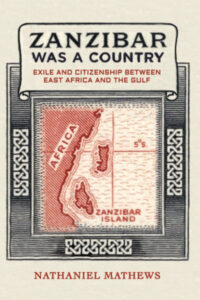 Although not explicitly stated, this book is based on the author’s doctoral dissertation and is the product of many years’ research on the relationships between the peoples of Zanzibar and of Oman. It begins with an introduction that establishes the problematic, and provides an overview of the history of Zanzibar, with particular attention to the Omani contribution in the longue durée, exploring the relationships between Oman and Zanzibar and the effects of the Zanzibar Revolution, and paving the way for the ensuing discussion.
Although not explicitly stated, this book is based on the author’s doctoral dissertation and is the product of many years’ research on the relationships between the peoples of Zanzibar and of Oman. It begins with an introduction that establishes the problematic, and provides an overview of the history of Zanzibar, with particular attention to the Omani contribution in the longue durée, exploring the relationships between Oman and Zanzibar and the effects of the Zanzibar Revolution, and paving the way for the ensuing discussion.
The rest of the book is divided into three parts. The first part, “Belonging in Zanzibar”, deals with the history of the Omani presence in Zanzibar, the rights that they claimed, and that were often contested or denied, in the Isles in the run-up to independence, and the political struggles between the ASP and the ZNP in the early 1960s. The author then goes on to the explore the events surrounding independence and the revolution and draws on new sources and eyewitness accounts, largely from those of Omani heritage, to flesh out the extant narratives of a period that has long been the subject of discussion among Zanzibaris; what is not in question is that the revolution led to the emigration of large numbers of Zanzibaris of Omani origin.
Part Two, “Belonging in Diaspora”, deals with the tensions between those who suffered under the revolution and the leaders of the revolution and their allies on the mainland, and gives voice to an opposition that was increasingly vocal, both inside Tanzania and, more significantly, in diaspora. Many refugees had ended up in the UK or in the Trucial States, particularly Dubai, and while many were simply engaged in trying to survive, others were speaking out against the Zanzibari regime. New narratives provide valuable insight into this period and the struggles in the diaspora.
“Belonging in Oman” investigates the place of returnee Omani Zanzibaris and their descendants in Oman, and a restoration, and a rethinking, of links, political, economic and social, between Oman and East Africa, leading to a renewed recognition of Oman’s place in the Indian Ocean world, itself inscribed within a growing if not uncontested acceptance of the place of Omanis of all descriptions, in contemporary Oman. Once again, the strength of the text is its use of primary sources, whether oral or published, to provide new insights into the encounter between the Swahili and the Omani worlds.
An obvious question that arises when exploring the movements of Zanzibaris of Omani origin in the 1960s is, why didn’t they go to Oman? Although the author acknowledges that the Omani administration regularly sent Omani Zanzibaris onward to Dubai, he does not explain why, nor does he explore the political context during the reign of Said bin Taimur, despite repeated references to the Imamate (centuries-old, but curiously described as “nascent” on p. 23), and the fact that refugees holding Imamate passports were generally refused entry to Oman. Most Manga Arabs were from the Omani interior – that is, from the Imamate – and it would have been interesting to hear how relevant the internal political struggles in Oman were to the reluctance of the Sultan to welcome subjects of the Imam, deposed and living in exile in Dammam and continuing to issue passports to Zanzibaris?
Choosing terminology when discussing diasporas is often difficult, but I found the author’s use of the term “Afro-Arab” – to refer to locally-born Zanzibaris with Omani origins – awkward, excluding as it does Omanis arrived as children, people of Hadrami origin (also Arabs), never mind mainlanders with Omani ancestry or Omanis with African ancestry, and thereby essentialising a category whose internal differences are often as great as those between themselves and others. The utility of the term even to the author seems dubious, given that he discusses many who do not meet his definition and one wonders why he felt the need to invoke the term, particularly since the very specific use of it here is not intuitive and requires explanation.
There are a few curious (if minor) errors – the author’s statement (p. 175) that Zanzibar is “the only Muslim majority ‘country’ in the region” will come as a surprise to both Comorians and Somalis; and the reference to “dhows that departed [from East Africa to the Gulf] from September to January” (pp. 107108) seems at odds with the fact that the monsoon saw northward-bound dhows generally leaving Zanzibar in March or April, certainly well before September. It would have been nigh impossible to sail northwards in December or January.
A final remark, perhaps not entirely the author’s fault, regarding the poor proofreading: multiple typos, mis-spellings, and in one case even an entire paragraph repeated (pages 106 and 126). In most cases the errors are obvious, but not always: for example, when the author refers to the Zanzibar nationality decree (which was promulgated in 1911) as existing “since 1941” is this an error or a typo? Regardless, this decree meant that Zanzibaris were of course never British subjects, and only became British Protected Persons in 1949. Incidentally, the status still exists, if only as a residual category: there are still a few (elderly) BPPs.
The strength of this text lies in the exploration and synthesis of hitherto unheard accounts of the period, particularly among Zanzibaris in the Gulf. The author is clearly familiar with and comfortable in both places, and this is evident in his work. This book will be a valuable contribution not only to the historiography of Zanzibar and the revolution, but to that of Oman and the wider Indian Ocean World.
Iain Walker
Iain Walker is Research Associate at the Max Planck Institute for Social Anthropology. He received his MA from the University of Edinburgh and his PhD from the University of Sydney. His principal ethnographic interests are in the Comoros, but he has also worked with Comorians in Zanzibar and on the Hadrami diaspora in the western Indian Ocean. He has published widely on these topics. His most recent book was Islands in a Cosmopolitan Sea: A History of the Comoros (2019).
MEMORIES OF GERMAN COLONIALISM IN TANZANIA. Reginald Elias Kirey. De Gruyter Oldenbourg, Berlin, 2023. xx + 247 pp. ISBN 9783110996296 (hardback) £82.00; ISBN 9783111055619 (eBook) open access via https://www.degruyter.com/document/doi/10.1515/9783111055619/ html.
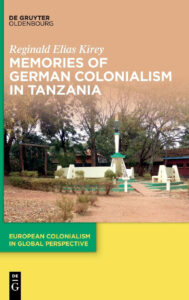 The author claims that “German colonialism [is] the most remembered colonial period in Tanzania” (p. 3). The first chapter elucidates the theoretical concept of “memory history” that informs the book, a concept not to be confused with “oral history”! The second chapter may be the reviewer’s favourite in the book. In the first instance, it details the oft-neglected fact that a significant number of Germans returned to Tanganyika in the 1920s or arrived for the first time. And of course, the processes of German incarceration, expulsion and selective renewal would be repeated in the context of the Second World War. The author details the interwar tensions between the territorial government and the various local German associations that began to echo metropolitan German aspirations. (Those readers interested in a more autobiographical representation of this period could usefully consult the 1995 publication of Werner Voight, 60 Years in East Africa.) This chapter also includes the saga of the lengthy return of Mkwawa’s skull as specified by the Treaty of Versailles. Kirey misses the 2017 Cambridge doctoral dissertation by Jeremiah Garsha that is devoted specifically to this topic (https://www.repository.cam.ac.uk/items/53cbed8f3602-49d7-b442-6cfef0f7922c).
The author claims that “German colonialism [is] the most remembered colonial period in Tanzania” (p. 3). The first chapter elucidates the theoretical concept of “memory history” that informs the book, a concept not to be confused with “oral history”! The second chapter may be the reviewer’s favourite in the book. In the first instance, it details the oft-neglected fact that a significant number of Germans returned to Tanganyika in the 1920s or arrived for the first time. And of course, the processes of German incarceration, expulsion and selective renewal would be repeated in the context of the Second World War. The author details the interwar tensions between the territorial government and the various local German associations that began to echo metropolitan German aspirations. (Those readers interested in a more autobiographical representation of this period could usefully consult the 1995 publication of Werner Voight, 60 Years in East Africa.) This chapter also includes the saga of the lengthy return of Mkwawa’s skull as specified by the Treaty of Versailles. Kirey misses the 2017 Cambridge doctoral dissertation by Jeremiah Garsha that is devoted specifically to this topic (https://www.repository.cam.ac.uk/items/53cbed8f3602-49d7-b442-6cfef0f7922c).
The third chapter deals with the issue of German official archives, documentation hidden, destroyed, and damaged – not only during the East African campaign but by benign neglect in later years. This chapter opens with an extensive quote allegedly by Marcia Wright, later Professor of History at Columbia University. Except it isn’t. The quotation actually comes from a government circular issued to respond to Wright’s 1962 report. (Her original report is available in the UNESCO digital archives; she published a revised version in a 1965 volume of The American Archivist.) Within this chapter the text suitably acknowledges the important local work of Peter Geissler and Eckhart Franz from Germany’s primary archivist school in Marburg. Yet the bibliography and footnotes remove their names from the 1973 published guide (cited over 20 times in this chapter) that details their work and instead assigns authorship to the Tanzanian government! There is also no mention that an updated version of the guide was published in 1984. In short, it is somewhat disconcerting to see an assured use of archival sources start to be combined with an often clumsy treatment of secondary sources. But let us return to the flow of analysis in this second chapter. The author provides a fascinating account of the recovery, translation and care of German records retrieved across the country, a process starting in the 1920s and arguably ending around 1935. Kirey tries to work this process into his theoretical framework of memory history; readers can decide how successful that is.
The discussion in subsequent chapters takes a more specific look at three geographical areas in Tanzania (Songea in the south, Moshi in the north and the administrative capital of Dar es Salaam). In those areas oral interviews elicit specific memories of that early period (some 20 in Songea, 24 in Moshi and 4 in Dar). Architectural edifices, old and more recent, are considered as visual reminders of the colonial past. Again, referential oddities start to appear here. Gilbert Gwassa’s Maji Maji research is featured here even though it did not take place within the confines of any administrative entity associated with Songea. Patrick Redmond’s specific research on the Ngoni, with its extensive coverage of Songea sources, is completely ignored. Footnote 11 on p. 89, referring to Heike Schmidt’s work, has an incorrect quotation and pagination. The colonial official R.M. Bell is mentioned but Kirey seems completely unaware that Bell’s consideration of Maji Maji was published in Tanganyika Notes and Records in 1950, and that a more extensive manuscript rendition of his research sits in the Bodleian library in Oxford. The Moshi section explores the role of German missionaries, yet arguably the greatest concentration of German missionary effort existed in the south of Tanzania.
The reviewer vacillates between fascination and exasperation when reading this book. One might suggest that the doctoral oversight in Hamburg was perhaps not as rigorous as it might have been and that the immediate rush to publication might have benefitted from a pause to solicit more local comment from colleagues in Dar es Salaam.
Lorne Larson
Lorne Larson was one of the first doctoral graduates in history from the University of Dar es Salaam. He has taught East African history in Tanzania and Nigeria. He specialises in the German colonial period and is most interested in the history of southern Tanzania.



